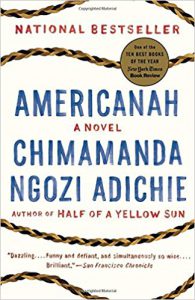Americanah, by Chimamanda Ngozi Adichie
Americanah
By Chimamanda Ngozi Adichie
Knopf
Five stars
Reviewed by Jessica Gribble
Less than a chapter into Americanah, I was already sorry it was going to have to end. We meet Ifemelu as she travels from her fellowship at Princeton to a braiding salon in Trenton, the closest place a Nigerian can get her hair done by women who know what they’re doing. Within the first few pages, we’ve already learned that Ifemelu has just finished writing a well-followed blog about race; is moving back to Lagos, leaving behind her white boyfriend Blaine; and is still thinking about her first love, Obinze, who has a wife and child in Nigeria. The rest of the novel teases out these threads. Chimamanda Ngozi Adichie’s nimble writing style includes telling the same stories from different points of view and quickly introducing characters and events so that readers are delighted by their familiarity when their longer stories unfold.
From Ifemelu, we learn very quickly what it’s like to be African in the United States, which is very different from being African American. About halfway into the novel, Adichie starts to include some of the text from Ifemelu’s blog about race in the United States, so we see through her eyes what it’s like to come from Nigeria, where she had never thought of herself as black, to the United States, where race is among the touchiest issues. As we slip back and forth in time we follow Ifemelu’s growing up, falling in love, hanging out with friends, eventually traveling to America, and finally returning to Nigeria—where there is some concern she’ll become Americanah, or a particular type of American returnee who doesn’t fit in either place.
Adichie’s dialogue is effortless; the reader will immediately feel at home with languages from Nigerian English to American slang. “Ahn-ahn! All of us were just waiting for the wedding invitation card o!” Ifemelu is the kind of woman most readers will want to be; smart, well spoken, bluntly honest. There’s no question why smart-but-still-cool, privately bookish Obinze loves her. He’s obsessed with the United States, but as fate will have it, he ends up in the UK while Ifemelu is in college in America. Their close bond frays when Ifemelu suffers through an incident she hesitates to tell him and abruptly stops communicating. Meanwhile, he’s busy trying to find a job in the UK without a work permit, and she’s becoming a well-known blogger and dating white men.
Though the main themes of Americanah are race and identity, the novel is never heavy-handed. My major criticism is that Ifemelu is far too bright and nuanced to be writing blog posts in the joky, self-deprecating style that’s so popular in the United States. However, that may be Adichie’s genius; an important part of the book is watching Ifemelu figure out how American and how African to be.
The love story between Obinze and Ifemelu is so compelling that readers will wait eagerly to learn if they ever meet again. Ifemelu’s return to Nigeria offers many possibilities—that she’ll meet Obinze again, or not; that she’ll be Americanah, never fitting back into Africa; that she’ll be miserable in a job after self-employment as a blogger. By the end of the novel, readers will care so deeply about Ifemelu they’ll be holding their breath to find out how her life unfolds back in Africa.
Adichie is a wonderfully gifted writer, and Americanah handles important issues so deftly and insightfully that I felt buoyed by the book and never wanted it to end. I wanted to be friends with Ifemelu—and because that’s impossible, I decided instead to read all of Adichie’s other novels.
